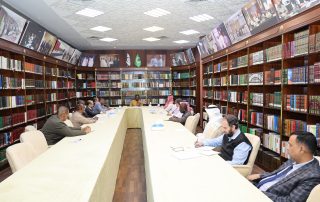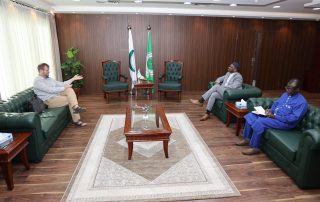
In the Name of Allāh,
the Entirely Merciful, the Especially Merciful
Praise is due to Allāh, Lord of the worlds, may the blessings and peace be upon our master Muḥammad, the last of prophets, on his family, and all his companions.
Resolution No. 161 (10/17)
Shariah Criteria for Biomedical Research on Human Beings
The Council of the International Islamic Fiqh Academy of the Organization of the Islamic Conference, holding its 17th session in Amman, Hashemite Kingdom of Jordan, on 28 Jumādā al-Ūlā – 2 Jumādā al-Ākhirah 1427h (24–28 June 2006), Having examined the research papers submitted to the Academy concerning
Shariah Criteria for Biomedical Research on Human Beings,
Having reviewed the document issued by the Islamic Organization for Medical Sciences, at its seminar entitled International Ethical Guidelines for Biomedical Research on Human Beings: An Islamic Perspective, held in Cairo on 29 Shawwāl – 2 Dhū al-Qi’dah 1425h (11–14 December 2004),
Having listened to the discussions on the subject,
Resolves
First: Accreditation of the General Principles in the Document
The Academy confirms the general principles and bases upon which the criteria regulating the ethics of biomedical research are founded as follows:
- Honoring and respecting the dignity of the human being is a fundamen- tal principle well-rooted in Shariah, because Allāh The Almighty said, «We have honored the children of Adam; provided them with transport on land and sea; given them for substance things good and pure; and conferred on them special favors above a great part of Our creation,» (Al-Isrā, 70)
It is therefore quite essential to grant full respect to the “mentally com- petent” person who volunteers to undergo biomedical tests for research purposes and give him the chance to make his decision independently and at his own will and satisfaction with no trace of being forced, mis- led, deceived or exploited, because of Shariah maxim that “The right of a human being should not be disposed of by any other without his permission.”
Shariah has also established guarantee, respect and protection for the person who does not have (or has incomplete) aptitude/competence even
in the face of his guardian. The general Fiqh maxims stipulate that “The person who has no aptitude for acting, his say is discarded too.” The Shariah has designated a guardian to take care of his matters and manage his affairs and made it incumbent upon the guardian to discharge this responsibility purely in the best way for achieving the incompetent per- son’s interests and prevented the guardian from taking any action that may harm him.
- Achievement of interest is another basic fundament of the Shariah indi- cated in the maxim of “Fetching interests of people and warding evil off ” In case of inevitable evil or harm, doing the lowest possible level is resorted to avoiding a higher-level evil or harm.
- Achievement of justice, which refers to the ethical commitment to treat- ing every person (male or female) honestly, correctly and fairly, is also an established fundament in the Shariah, being a practical manifestation of the principle of establishing justice and fairness that is deep-rooted in Islam and made the core of righteousness, success and prosperity in
- Doing of generous good (al-Iḥsān) has been ordained in the most com- prehensive verse in the Quran that incites people to achieve all interests and prevents them from committing any evil or harm when Allāh The Almighty said, «Allāh commands justice, doing Iḥsān, etc.» (Al-Naḥl, 90).
Second: Criteria for Biomedical Research on Human Beings
The Academy confirms its endorsement of the criteria of biomedical research on human beings as stated in the document referred to in the preamble of this resolution and acknowledges that these criteria regulate biomedical research in conformity with the maxims and rules of the Shariah. Furthermore, the Academy calls upon the Islamic Organization for Medical Sciences to organ- ize an enlarged seminar that comprises physicians and Fuqahā to deepen the knowledge about these criteria.
Recommendations
- The Academy appeals to the concerned authorities in Muslim countries to provide support to research and researchers through the allocation of sufficient budgets, enhancing research facilities and meeting the academic and personal needs of researchers to motivate them to devote all their time for discharging their duties towards their countries.
- The Academy calls upon the Muslim countries to benefit from scholars of Ummah who are outside the Muslim countries, for they are a great
asset to the Ummah by opening up channels of communication with them and encouraging them to cooperate with their Muslim peers in the process of building up solid bases for scientific research in the Muslim countries.
- The Academy calls upon the Islamic Organization for Medical Sciences of Kuwait and the ministries of health in the Muslim countries to organize training courses for workers in medical and health Fiqh and professional ethics with special emphasis on ethics of scientific research criteria stated in this resolution.
Indeed, Allāh is All-Knowing.
Read Also
Lastest








